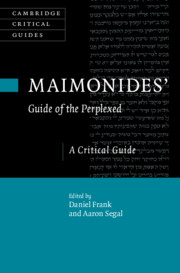Book contents
- Maimonides’ Guide of the Perplexed
- Cambridge Critical Guides
- Maimonides’ Guide of the Perplexed
- Copyright page
- Contents
- Contributors
- Introduction
- Part I Form
- Part II Human Beginnings
- Part III The Creator
- Part IV The Created
- Part V Human Finitude
- Chapter 11 Maimonides’ Critique of Anthropocentrism and Teleology
- Chapter 12 Maimonides and the Problem(s) of Evil
- Part VI Human Ends
- Bibliography
- Index
- Cambridge Critical Guides
Chapter 11 - Maimonides’ Critique of Anthropocentrism and Teleology
from Part V - Human Finitude
Published online by Cambridge University Press: 18 June 2021
- Maimonides’ Guide of the Perplexed
- Cambridge Critical Guides
- Maimonides’ Guide of the Perplexed
- Copyright page
- Contents
- Contributors
- Introduction
- Part I Form
- Part II Human Beginnings
- Part III The Creator
- Part IV The Created
- Part V Human Finitude
- Chapter 11 Maimonides’ Critique of Anthropocentrism and Teleology
- Chapter 12 Maimonides and the Problem(s) of Evil
- Part VI Human Ends
- Bibliography
- Index
- Cambridge Critical Guides
Summary
One of the most provocative chapters in Maimonides’ Guide of the Perplexed is part 3, chapter 13. In this chapter, Maimonides criticizes anthropocentrism and teleology. He argues, inter alia, that it is pointless to seek the telos of the universe; that the universe was not created for the sake of humans; and that all beings were intended for their own sakes, not for the sake of something else. These views were rejected by many later philosophers, like Thomas Aquinas, Levi Gersonides, Moses Narboni, Hasdai Crescas, Isaac Arama, Saul Morteira, and Gottfried Wilhelm Leibniz. Narboni wrote: “I am very perplexed by the Master! … [His words] contradict all the sciences. For the goal of all the sciences is to know the final end … This is no less than the abolition of the nature of the intellect!” Crescas wrote: “[It cannot be] what appears from the literal sense of the Master’s words. Heaven forfend that it should be attributed to God what would be a grave defect in any intelligent being,” namely, acting with no purpose! Arguably “[the most] systematic effort to rebut Maimonides’ discussion [in Guide 3.13]” was that of Saul Levi Morteira, Spinoza’s teacher. Spinoza, however, was not convinced by him. Indeed, he was the first major philosopher to embrace wholeheartedly Maimonides’ criticisms of anthropocentrism and teleology. Maimonides’ discussion in Guide 3.13, formatively influenced Spinoza’s celebrated assault on final causality in his appendix to part 1 of Ethics.
Keywords
- Type
- Chapter
- Information
- Maimonides' Guide of the PerplexedA Critical Guide, pp. 209 - 222Publisher: Cambridge University PressPrint publication year: 2021

